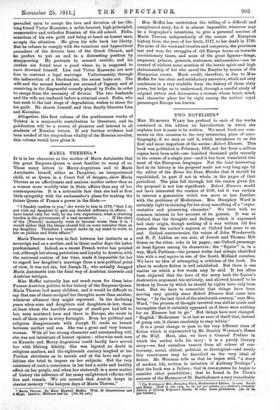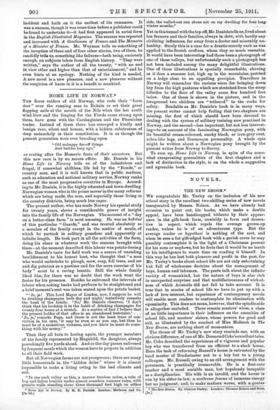TWO NOVELISTS,
AIRS. HUMPEIRY WARD has prefixed to each of the works contained in this edition an Introduction, in which she explains how it came to be written. We must limit our com- ments on this occasion to the very interesting piece of auto- biography, if we may so call it, which introduces to us the first and most important of the series—Robert Elsmere. This book was published in February, 1888, not far from a million copies have been sold—one hundred thousand quite recently in the course of a single year—and it has been translated into most of the European languages. Not the least interesting fact in its history is the proposal made not very long ago by the editor of the Revue des Deux Mondes that it should be republished, in part if not in whole, in the pages of that periodical. The plan fell through, but the reason given for the proposal is not less significant. Robert Elsmere would not have interested the readers of 1S88, but it was certain to interest a generation which was more or less familiar with the problems of Modernism. Mrs. Humphry Ward is certainly right in claiming for her story something of a " repre- sentative and pioneering character." We turn with no common interest to her account of its genesis. It was at Oxford that the thoughts and feelings which it expressed had their origin, though nothing of it was written till five years after the author's sojourn at Oxford had come to an end. Oxford controversies, the voices of John Wordsworth and H. P. Liddon on one side, of Jowett and Thomas Hill Green on the other, echo in its pages ; one Oxford personage at least figures among its characters : the " Squire " is, in a way, Mark Pattison—the present writer had always identified him with a real squire in one of the South Midland counties. We have no idea of attempting a criticism of the book. Its place in modern fiction is well established. But there is one matter on which a few words may be said. It has often been objected that the hero of the story took the Squire's destructive argument too seriously, and allowed himself to be broken by forces by which he should by rights have only been bent. But we have to remember that things have been moving very quickly since Robert Elsmere first came into being. " In the last third of the nineteenth century," says Mrs. Ward, " the process of thought involved was still so crude and incomplete that it certainly appeared as if there were nothing for an Elsmere but to go." But things have now changed. " English Modernism ' is at last so sure of itself that, instead of going out, it claims resolutely to stay within."
It is a great change to pass to the very different class of fiction which is represented by Mr. Stanley Weyman's Homo of the Wolf. Here, also, we have a General Preface in which the author tells his story : it is a purely literary story—we find ourselves remote from all echoes of con- troversy, social, ethical, political, or theological—and surely this remoteness may be described as the very ideal of fiction. Mr. Weyman tells us that he began with " a story of modern life, written in imitation of Anthony Trollope "; that the book was a failure ; that in coneeluence he began to consider other possibilities ; that he found in De Thou's account of the Massacre of St. Bartholomew a very remarkable The Writings of Mrs. Humphry Ward, Westmorland Edition. 14 role. Smith and Elder. [Sold in sets only, 71. tsd. net Ter volutne.]---Author's Couplet. Edition of Stanley Weyman's Yovels, 20 To Li. Same publishers. [2a. or 3s. per volume.] incident and built on it the earliest of his romances. It was a success, though it was sometime before a publisher could be found to undertake it—it had first appeared in serial form in the English Illustrated Magazine. The success was repeated and increased with A Gentleman of France and The Memoirs of a Minister of France. Mr. Weyman tells us something of the inception of these and of four other stories, two of them, he candidly tells us, something like failures—both being, curiously enough, on subjects taken from English history. " They were written," says the author of all the twenty, " with no end in view other and higher than that of entertainment," and he even hints at an apology. Nothing of the kind is needed. A new novel is a new pleasure, and a new pleasure without the suspicion of harm in it is a benefit to mankind.



















































 Previous page
Previous page